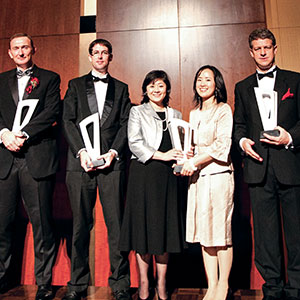Forty years ago this month, I was a television network presenter based at the BBC Television Centre in White City, and mainly working on BBC Two. But I was also looking forward to a move that, though I couldn’t have known it then, would literally change my life.
At the time, the BBC had a Japanese language service that was run out of London’s Bush House, the home of its World Service. The Japan Broadcasting Corporation, NHK, provided native speaking announcers and producers to run this service and, in exchange, the BBC seconded members of staff to NHK in Tokyo. In June 1976, I was selected for that secondment.
The nature of my arrival in Tokyo has been recounted before but it bears retelling. In those pre-Narita days, I arrived at Haneda airport, which was seething with people. It seemed that every jumbo jet in JAL’s fleet had arrived at the same time. I was nervous but excited as I joined the queue, passport with precious visa in hand, inching my way forward towards the man at a high desk at the head of the line.
When my turn finally came, I brandished my passport, which the functionary dismissed with a wave of his hand and asked in a bored voice, “Where is your pineapple?” For one gloriously Pythonesque moment I was tempted to reply that I didn’t know I needed one, but a helpful young lady from JAL approached to escort me from Plant Quarantine and point me in the direction of Immigration, where I waited all over again.
It was an unusual beginning to what proved to be an unusual assignment. Originally planned as a two-year contract, it was quickly extended to four years as I fell in love almost immediately with Japan and my newfound family of colleagues at NHK.
My work principally centred on Radio Japan, a short-wave service that broadcast around the world, though much of the programming I worked on was for Australasia. One regular commitment was a feature called Hello Australasia! that found me partnered with the delightful Kaoru Kubo whose dulcet tones will be familiar to many readers. Hers is the voice that exhorts us not to use our mobile phones on the Narita Limousine buses.
There were other programmes too, including Tokyo Report, a documentary series that allowed me to interview prominent individuals such as late music composer Isao Tomita (1932–2016) and print artist Toko Shinoda (1913– ). It also gave me the chance to travel around the country. Memorable trips include a visit to Hiroshima where I made The Shadow on the Wall, a documentary.
I talked to people who had been victims of the atom bomb, and I experienced the power of the Peace Memorial Museum.
Another trip I remember with great clarity was in 1977, to the Sapporo Snow Festival in Hokkaido. As I said in my introduction to the programme: “This year has been especially cold and there’s been more snow here this winter than there has been for over a decade”.
I seem to have been particularly taken with the snow-built replica of Germany’s Marienplatz—the most famous square in Munich—describing it as “complete in every detail: town hall, statues, fountains alike, and to a scale that overshadowed many of the solid buildings around about … I am full of awe for the genius behind such undertakings”.
And I recorded members of the Japan Self-Defense Forces who, dressed in shorts and happi-coats, drummed out the traditional rhythms of Hokkaido. “It is a sound I shall remember long after the snow palaces of Sapporo have returned to the rivers and the sea”, I said.
Other aspects of my work during my time in the position focused on television work including the English subtitling of NHK dramas bound for overseas competitions and sale. I also undertook the recording of English language narrations for documentaries with similar fates. This stood me in particularly good stead for a later project when I would provide the English language scripts and narrations for a series of programmes made by Nippon TV on the restoration of the Sistine Chapel, Vatican City.
It’s hard to believe it all began those 40 years ago.






